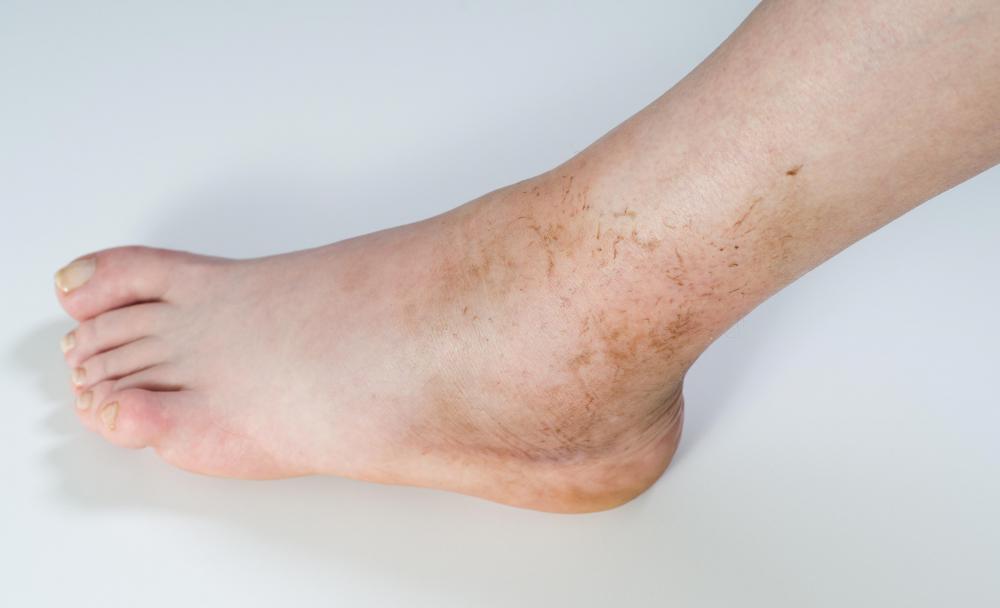At TheHealthBoard, we're committed to delivering accurate, trustworthy information. Our expert-authored content is rigorously fact-checked and sourced from credible authorities. Discover how we uphold the highest standards in providing you with reliable knowledge.
What is a Glomerulus?
A glomerulus, plural glomeruli, is a knot of extremely tiny blood vessels involved in filtering the blood to form urine. There are many glomeruli inside the kidney, each contained within a capsule known as Bowman's capsule. Blood at high pressure passes into the glomerulus through a tiny artery. Water and soluble waste products filter out of the blood through the leaky walls of the glomerulus and enter a space inside Bowman's capsule before draining away through a tube, called a renal tubule, into the bladder. The remaining blood leaves the glomerulus through another small artery to rejoin the general circulation.
Each glomerulus and its associated renal tubule make up a unit known as a nephron, and in humans there are more than a million nephrons in each kidney. Normally, the glomerular filtration rate is so efficient that the whole of the blood volume passes through the kidneys within about five minutes. The tiny artery supplying the glomerulus is called an afferent arteriole, and it divides into numerous tiny vessels, or capillaries, to form the capillary tuft that is the glomerulus. Blood pressure inside the glomerulus is relatively high, helping to force blood out of the capillaries. The capillary walls are full of minute pores through which filtration occurs.

Bowman's capsule has two walls with a space in between. One wall fits tightly around the glomerular capillaries and serves as an extra layer through which blood is filtered. Special cells called podocytes make up this wall, with finger-like projections which interlock to form filtration slits. Blood must pass through these slits as well as filtering through the pores in the glomerular capillaries; this helps prevent large molecules from passing into the space in Bowman's capsule. Podocytes also help hold the glomerular structure together, stopping it from expanding in response to the high pressure inside it.

Glomerular disease, where the glomeruli become inflamed or scarred, usually causes problems with filtration. A wide range of illnesses can involve the glomeruli, including HIV and diabetes. Typically, the glomerular filter becomes more permeable, resulting in loss of protein and blood into the urine. Removal of waste products may not be as effective, leading to them building up in the blood. Symptoms may include foamy and pink urine and swollen ankles or hands.

Treatment of glomerular disease depends on the specific illness, but if the damage to glomerular tissue is extensive enough that the kidneys fail, patients will need dialysis. Dialysis may involve filtering blood through a machine, known as hemodialysis, or through a membrane in the abdomen, known as peritoneal dialysis. There may also be the option of having a kidney transplant.
AS FEATURED ON:
AS FEATURED ON:

















Discussion Comments
@Telsyst: I started attending a junior college for the purpose of becoming a RN down the road. I spent my whole life studying external subjects, but only learned about the mind. There is more to learn internally (the body) and I am happy that I can do it for the rest of my life.
Your post provides insightful and overlooked aspects of the human body! It is clear that you have studied and have been able to make sound connections between man and the environment! Reach for your potential!
It's really hard to believe, but urine is typically sterile. It doesn't seem like it could be true with the human body being as dirty as it is.
Urine has a multitude of purposes. It can contain antibodies that can be studied and used for diagnosis. Urine contains some chemicals that are useful in creating medicines. The urine from a pregnant woman can be extracted, purified, refined and used to treat infertility.
Pregnant horse urine is a main source for extracting estrogen which has a wide range of uses.
Urine has uses in the farming field too. Large amounts of nitrogen, potassium and phosphates are dissolved in the urine. Pure urine is far too rich to directly benefit plants. Pure urine will burn the roots of plants. Urine needs to be diluted to be used as a fertilizer to get those nutrients into the soil.
The part no one wants to even think about is the ammonia in urine which made it a natural cleaning agent through the ages. Not only that, it's what ancient Romans used to keep their teeth white.
Post your comments